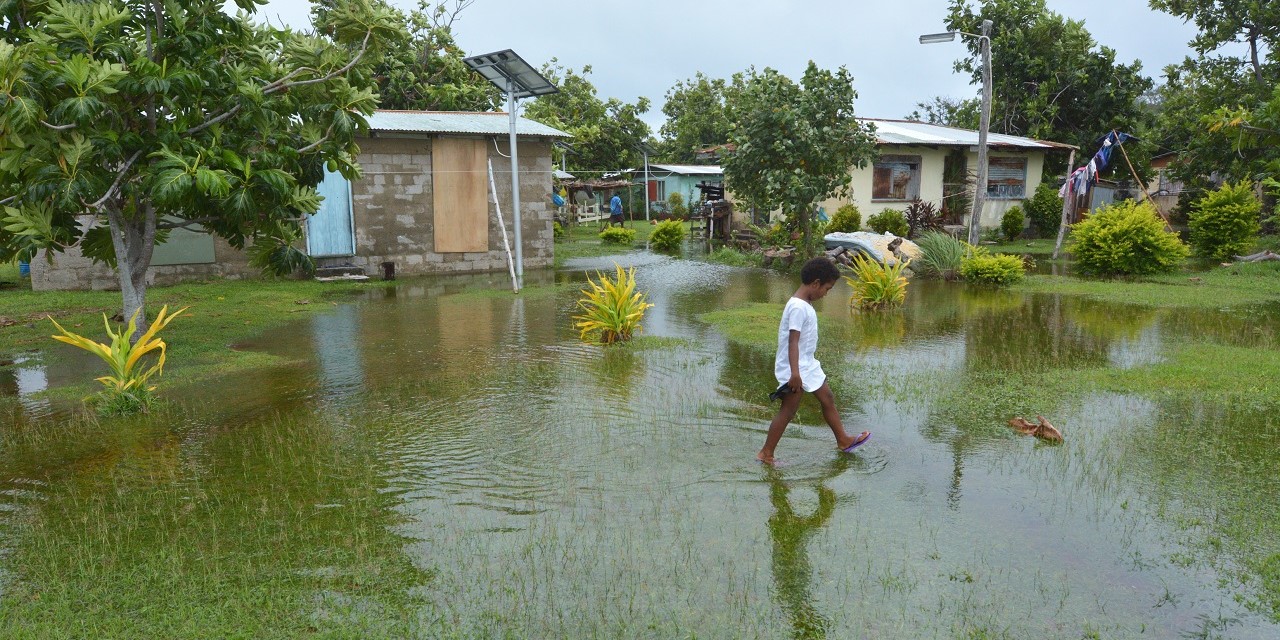Climate Change and Conflict By Sabira Coelho and Christopher Yee | 12 October, 2021
Pacific Civil Society Concludes Regional Consultations on Climate-Related Mobility

Image: Shutterstock
In June 2021, the Pacific Climate Change Migration and Human Security (PCCMHS) programme hosted the regional civil society consultation on climate-related mobility. The online consultations were organised by the International Organization for Migration (IOM) and provided an opportunity for civil society representatives from around the Pacific to review the human security implications of climate change-related migration, displacement and planned relocation, share experiences about how climate-related mobility is impacting communities and talk towards the development of a regional based solution.
Over 40 virtual participants from eight Pacific Countries across the region gathered in an act of solidarity to continue discussions on a regional process in support of responses to climate-related mobility. The consultations included regional organisations, members of academia, faith-based organisations, youth climate champions and advocates for LGBTIQ groups from around the Pacific.
A key target of the PCCMHS programme was to ensure that civil society perspectives inform the development of a regional state-led response, as the civil society consultations also aim to cultivate a shared understanding and common approach to climate related-mobility in the Pacific.
Solomon Kantha, IOM Chief of Mission in Fiji, stated that the consultations would be an “opportunity to examine climate-related mobility trends in the Pacific, understand where the key legal and policy gaps exist, discuss what policy makers and Governments need to consider and search for suitable protection pathways going forward at a regional level to safeguard the rights of all Pacific Islanders who need to move because of the impacts of climate change”.
Day one of the consultations laid out experiences that were shared by communities who have been impacted by climate-related mobility. What became clear was that from a Pacific perspective, there is a need to protect the social and cultural fabric of relocated communities along with the need to protect ancestral land, language and rights for families who need to relocate in the future. This point was re-emphasized significantly as many participants spoke of the invaluable ‘non-economic losses’ that may be experienced in the context of climate-related mobility.
In demonstrating strong Pacifica leadership amongst civil society actors, Pefi Kingi of PacificWin echoed bold sentiments about the need to develop “regional frameworks that create safe pathways, uphold human rights and focus on the preservation of cultural identity for future generations”.
Under session two, participants received a comprehensive overview of where the key legal and policy gaps were in the climate-related mobility landscape before exploring human rights-based solutions.
Finally, day two of the consultations provided a space for civil society members to develop key advice and messages towards government officials and policymakers before discussing the role of CSOs in raising the issue of climate-related mobility and exploring the different pathways that could be used to amplify issues relating to climate mobility around the Pacific region.
Solomon Yeo and Atina Schutz of the Pacific Island Students Fighting Climate Change (PISFCC) strongly emphasized the need for youth involvement in policy development as youth currently comprise the majority of the Pacific population and have great potential for adding value to the collective efforts in the response against climate related mobility.
What became clear during the consultations is that regional solidarity on climate related mobility is needed to ensure that no community is left behind. An additional message that was echoed by participants was that a regional framework is needed to address the issues of climate-related mobility in the Pacific region by creating safe migration pathways for communities that have no choice but to move, upholding the human rights of migrant communities in the Pacific and recognising the need to preserve and respect cultural and identity.
Ongoing momentum in the climate-related mobility space continues as the PCCMHS programme has also completed national consultation on climate-related mobility in Nauru, Fiji, Tonga, Tuvalu and Vanuatu. These consultations were attended by key Government officials, civil society representatives, community leaders and stakeholders.
A key component of the programme is to support Pacific Governments to identify a regional response to address protection gaps for communities that are at risk of displacement, move due to climate change and are relocated. As a result, the contributions from this consultation and national consultations organised in 13 Pacific countries will go towards the development of a regional state-led response to addressing climate mobility.
Sabira Coelho currently serves as the Programme Manager at IOM Fiji for the three-year joint-programme, Pacific Climate Change Migration and Human Security”. Previously, Sabira served as the Regional Migration Environment and Climate Change Officer at the IOM’s Regional Office for Asia and the Pacific for 6 years. During this time, Sabira provided technical support to IOM missions in Mongolia, Bangladesh, Nepal, Maldives, Cambodia, Vietnam and the Pacific region.
Christopher Yee currently serves as the Programme Specialist under the Pacific Climate Change Migration and Human Security programme.